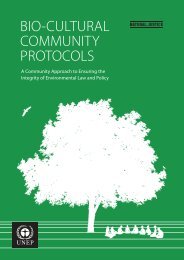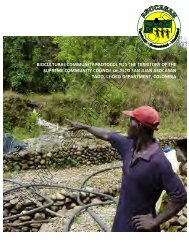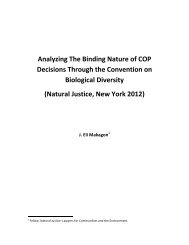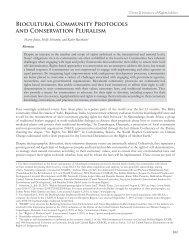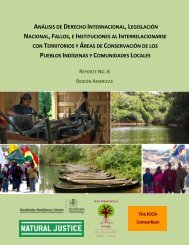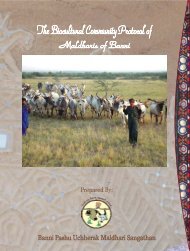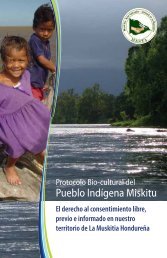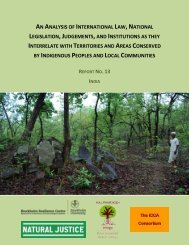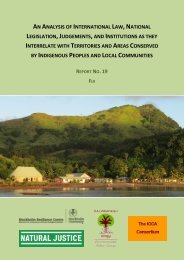English - Natural Justice
English - Natural Justice
English - Natural Justice
Create successful ePaper yourself
Turn your PDF publications into a flip-book with our unique Google optimized e-Paper software.
. Recommendations for Legislating for Integrated Socio-ecologicalSystems and Implementing Laws in Conformity with HumanRights StandardsThe effect that legal and institutional fragmentation has had on otherwise interconnectedsystems cannot be overstated. What is required is a shift from a disaggregated anddiscriminatory approach to the law to one that supports Indigenous peoples and localcommunities and the ecosystems and broader territories and areas upon which theydepend. Governments should legislate for dynamic landscapes, seascapes and humanenvironmentsystems, not for their constituent components as distinct entities. This needsto be augmented by the integrated implementation of laws in conformity with human rightsstandards alongside localized, bottom-up efforts.Recognize and Respect Customary and Collective Land and Resource RightsThe research strongly underscores the critical importance of legal recognition of Indigenouspeoples’ and local communities’ (including women therein) customary and collective landand resource rights to maintaining the integrity of their ICCAs. Yet, many Indigenous peoplesand local communities have only de facto rights to their territories and resources, not formallegal rights recognized by the state. Accordingly, land tenure systems that recognize andrespect customary and collective land and resource rights are urgently required. Notably,any land tenure reforms must accord with the local populations’ customs (while requiringlegitimate equity considerations), especially providing for collective or communal tenurewithout imposed restrictions or requirements for ‘development’ or other uses. Such reformsshould also include simpler procedures with lower costs and fewer bureaucratic barriers torealizing those rights.Customary and Collective RightsIn terms of current legislation, the Fijian i Taukei Lands Act provides in Section 3 that ‘nativelands shall be held by native Fijians according to native custom as evidenced by usage andtradition.’ This provision allows for a broad spectrum of usage and governance rights definedby native custom andtradition, as well as beingsubject to the regulationsmade by the iTaukei AffairsBoard. Section 21 of theForest Decree gives provisionfor the customary rights ofnative Fijians on native landand the right to exercise anyrights established by nativecustom such as hunting,fishing or collecting wildfruits and vegetables.According to Section 13 ofthe Fisheries Act, it is anoffence to fish or collectshellfish without a permit for A ridge-to-reef seascape from Waya Island, Fiji. © Stacy Jupitertrade or sale in an area




